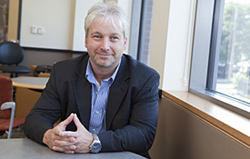How Pathogens Hijack Host Plants
 Palo Alto, CA — Infestation by bacteria and other pathogens result in global crop losses of over $500 billion annually. A research team led by the Carnegie Institution’s Department of Plant Biology developed a novel trick for identifying how pathogens hijack plant nutrients to take over the organism. They discovered a novel family of pores that transport sugar out of the plant. Bacteria and fungi hijack the pores to access the plant sugar for food. The first goal of any pathogen is to access the host’s food supply to allow them to reproduce in large numbers. This is the first time scientists have a direct handle on controlling the food supply to pathogens and thus a new means to prevent a wide range of crop diseases and losses. (more…)
Palo Alto, CA — Infestation by bacteria and other pathogens result in global crop losses of over $500 billion annually. A research team led by the Carnegie Institution’s Department of Plant Biology developed a novel trick for identifying how pathogens hijack plant nutrients to take over the organism. They discovered a novel family of pores that transport sugar out of the plant. Bacteria and fungi hijack the pores to access the plant sugar for food. The first goal of any pathogen is to access the host’s food supply to allow them to reproduce in large numbers. This is the first time scientists have a direct handle on controlling the food supply to pathogens and thus a new means to prevent a wide range of crop diseases and losses. (more…)

